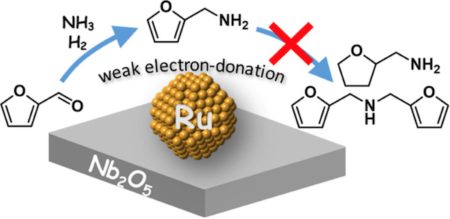Sep
6
New Catalyst Found to Make Biofuels and Amines
September 6, 2017 | 5 Comments
Tokyo Institute of Technology (Tokyo Tech) researchers have developed a highly efficient reusable catalyst for the production of primary amines. By cutting the amount of undesired by-products, the catalyst is set to revolutionize the production of bio-based fuels, pharmaceuticals, agricultural chemicals and much more.

Illustration of the Ru/Nb2O5 catalyst. The weak electron-donating capability of ruthenium (Ru) nanoparticles supported on niobium pentoxide (Nb2O5) is thought to promote reductive amination while preventing the formation of undesirable by-products. Image Credit: Tokyo Tech. Click image for the largest view.
The researchers at Tokyo Tech have developed a highly selective catalyst consisting of ruthenium nanoparticles supported on niobium pentoxide (Ru/Nb2O5). In a study published in the Journal of the American Chemical Society, the team demonstrated that Ru/Nb2O5 is capable of producing primary amines from carbonyl compounds with ammonia (NH3) and dihydrogen (H2), with negligible formation of by-products.
Known for their outstanding versatility, primary amines (derivatives of ammonia) are industrially important compounds used in the preparation of a very wide range of products including dyes, detergents and medicines. Although many attempts have been made to improve their synthesis using catalysts containing nickel, palladium and platinum, for example, few have succeeded in reducing the formation of secondary and tertiary amines and other undesired by-products.
The study compared the extent to which different catalysts could convert furfural to furfurylamine in a process known as reductive amination1. This reaction is one of the most useful methods for producing primary amines on an industrial scale. The Ru/Nb2O5 catalyst outperformed all other types tested – remarkably, a yield of 99% was attained when ammonia was used in excess quantity.
Even after three recycles, the Ru/Nb2O5 catalyst achieved consistent results, with consecutive yields of over 90%. The superior catalytic efficiency is thought to be due to ruthenium’s weak electron-donating properties on the Nb2O5 surface.
For fuel production use, Michikazu Hara of Tokyo Tech’s Laboratory for Materials and Structures and his co-workers, explored how effectively the new catalyst could break down biomass (in the form of glucose) into 2,5-bis(aminomethyl) furan, a monomer for aramid production. Previous experiments using a nickel-based catalyst led to a yield of around 50% from glucose-derived feedstock (5-hydroxymethylfurfural). The new catalyst used in combination with a so-called ruthenium-xantphos complex produced a yield of 93%. With little to no by-products observed, Ru/Nb2O5 represents a major breakthrough in the clean, large-scale production of biomass-derived materials.
Further studies to expand on these initial findings are already underway. By pushing the boundaries of material design, the researchers say that Ru/Nb2O5 may accelerate the production of environmentally friendly plastics, rubber and heat-resistant aramid fibers. In future, the Ru/Nb2O5 catalyst may also impact the development of novel anti-cancer drugs, anti-bacterials, pesticides, agrochemicals, fertilizers, bio-oils and biofuels.
For many, if not most, this breakthrough may seem obscure. But the industrial production of basic chemicals for the modern way of life is a high volume and high value added part of the economic complex. This catalyst offers a really remarkable, even breakthrough level of importance in a chemical production in a very wide range of products such that raw stocks can be used more completely and likely production could well be done at lower costs. From medicines to bio fuels this is very good news indeed.
Comments
5 Comments so far


It is an excellent discovery for all of us. Good!
Biofuel is good source, it should be produced as much as possible.
There is no doubt that this is a great scientific study. It will make great contribution to the progress of science and technology, and it is also an important step for human beings to protect the environment.
It is a great invention,Biofuel is a kind of renewable energy, which can help us realize energy saving as well as environmental protection.
This is a great study.And the biofuels have become more and more important.